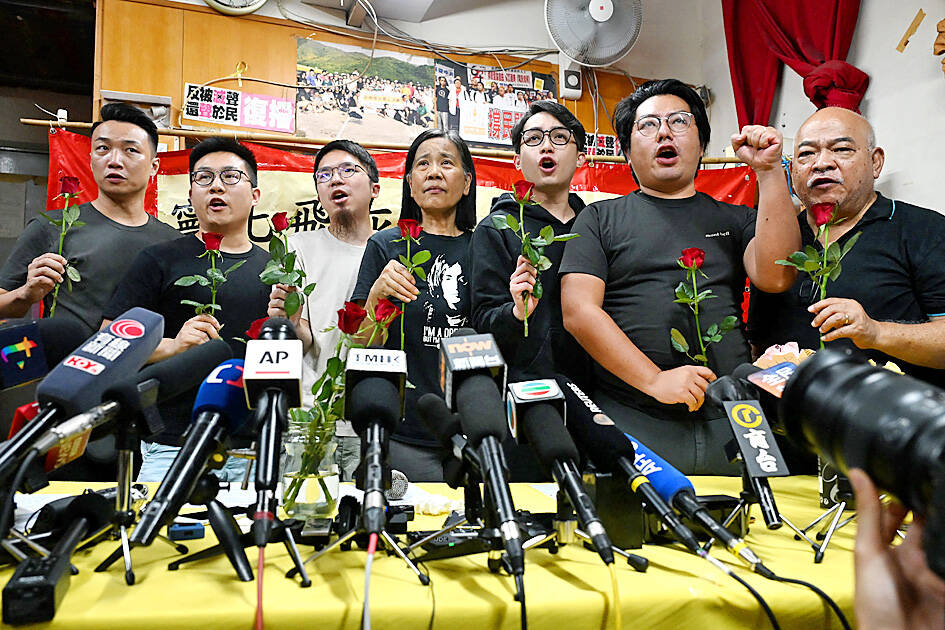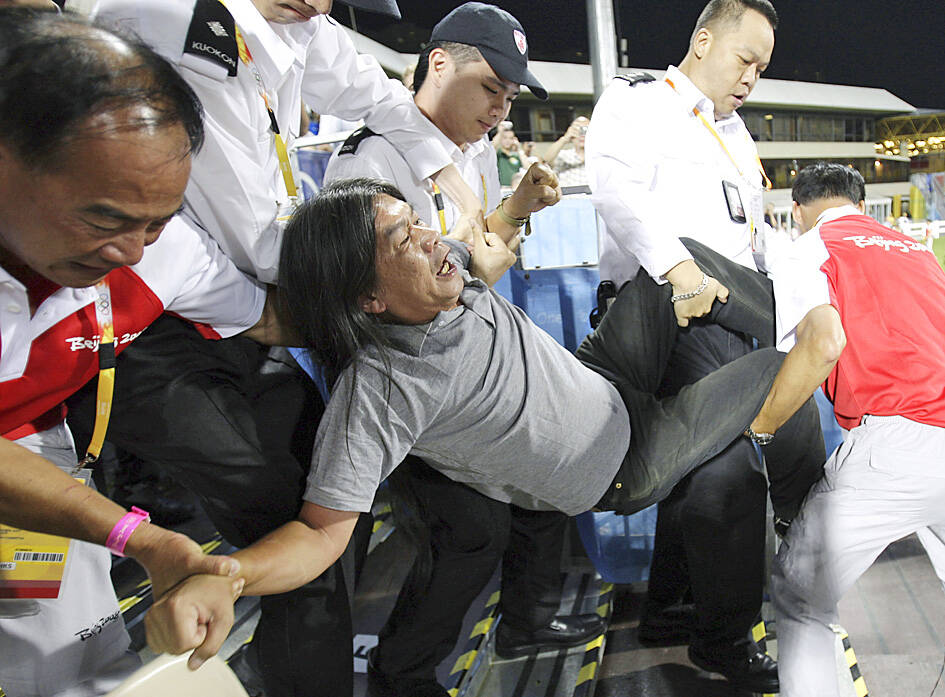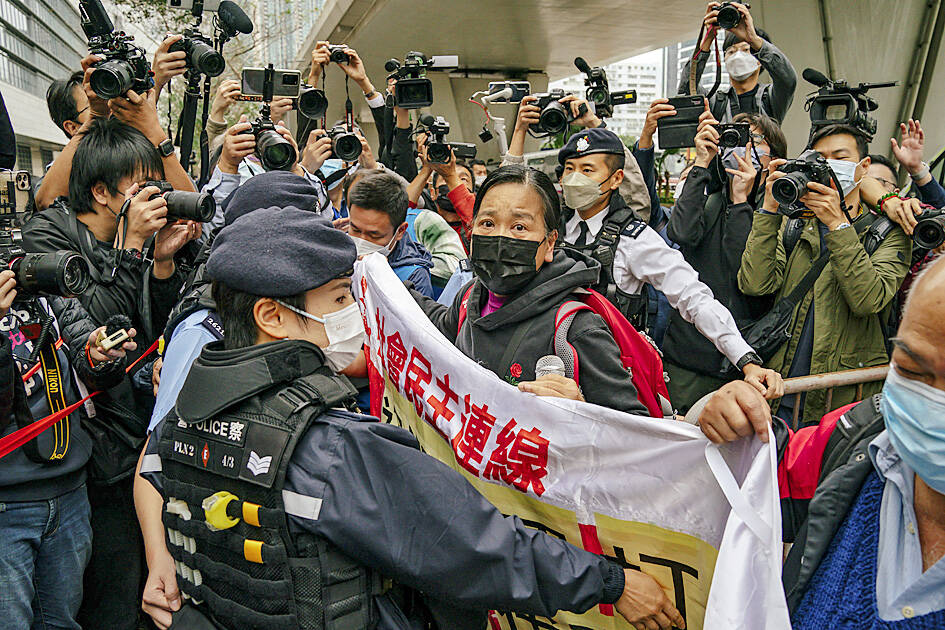One of Hong Kong’s last remaining opposition parties has officially disbanded, its leader announced Sunday, citing "immense political pressure" as Beijing presses on with its years-long crackdown on dissent.
The League of Social Democrats (LSD), founded in 2006, championed democratisation and grassroots issues in Hong Kong’s legislature and on the streets.
It is the latest opposition party to cease operating after Beijing imposed a national security law on Hong Kong in 2020 to curb dissent and end democracy protests that had brought the financial hub to a standstill.

Photo: AFP
"In the face of immense political pressure and after careful deliberation -- particularly with regard to the consequences for our members and comrades -- we have made the difficult decision to disband," LSD said in a statement.
Party chair Chan Po-ying said at a press conference that the decision to disband had been unanimous.
Asked if the pressure had come from Beijing’s middlemen, Chan said she could not disclose details.

Photo: AP
LSD, which had called for direct elections for the city’s leader and legislature, won three seats in Hong Kong’s Legislative Council at the height of its popularity in 2008.
Its lawmakers were known for their colourful heckling and symbolic protests in legislative sessions, which included lobbing bananas and fish sandwiches at the city’s leadership.
- ’Domino effect’ -

Photo: AP
Fernando Cheung, spokesperson for Amnesty International Hong Kong Overseas, said LSD’s dissolution "further reveals the near purging of Hong Kong’s pan-democratic political parties and civil society organisations".
After the imposition of the national security law and with most of the city’s democracy campaigners jailed or overseas, the Civic Party closed in 2023 and in February, the Democratic Party began winding down.
One of LSD’s founding members, "Long Hair" Leung Kwok-hung, remains behind bars after being found guilty of subversion last year, as part of Hong Kong’s largest national security trial.
Another LSD activist, Jimmy Sham, was also jailed in the same case. He was released from prison last month.
In recent years, LSD had limited its public activities to a Sunday street booth in a shopping district where a handful of activists handed out flyers while filmed by police.
Chan said that Hong Kong is witnessing a "domino effect" and that her group will not be the last to fold, urging people "on the one hand to survive, and on the other hand to try to exercise our rights as citizens".

CHAOS: Iranians took to the streets playing celebratory music after reports of Khamenei’s death on Saturday, while mourners also gathered in Tehran yesterday Iranian Supreme Leader Ayatollah Ali Khamenei was killed in a major attack on Iran launched by Israel and the US, throwing the future of the Islamic republic into doubt and raising the risk of regional instability. Iranian state television and the state-run IRNA news agency announced the 86-year-old’s death early yesterday. US President Donald Trump said it gave Iranians their “greatest chance” to “take back” their country. The announcements came after a joint US and Israeli aerial bombardment that targeted Iranian military and governmental sites. Trump said the “heavy and pinpoint bombing” would continue through the week or as long

TRUST: The KMT said it respected the US’ timing and considerations, and hoped it would continue to honor its commitments to helping Taiwan bolster its defenses and deterrence US President Donald Trump is delaying a multibillion-dollar arms sale to Taiwan to ensure his visit to Beijing is successful, a New York Times report said. The weapons sales package has stalled in the US Department of State, the report said, citing US officials it did not identify. The White House has told agencies not to push forward ahead of Trump’s meeting with Chinese President Xi Jinping (習近平), it said. The two last month held a phone call to discuss trade and geopolitical flashpoints ahead of the summit. Xi raised the Taiwan issue and urged the US to handle arms sales to

BIG SPENDERS: Foreign investors bought the most Taiwan equities since 2005, signaling confidence that an AI boom would continue to benefit chipmakers Taiwan Semiconductor Manufacturing Co’s (TSMC, 台積電) market capitalization swelled to US$2 trillion for the first time following a 4.25 percent rally in its American depositary receipts (ADR) overnight, putting the world’s biggest contract chipmaker sixth on the list of the world’s biggest companies by market capitalization, just behind Amazon.com Inc. The site CompaniesMarketcap.com ranked TSMC ahead of Saudi Aramco and Meta Platforms Inc. The Taiwanese company’s ADRs on Tuesday surged to US$385.75 on the New York Stock Exchange, as strong demand for artificial intelligence (AI) applications led to chip supply constraints and boost revenue growth to record-breaking levels. Each TSMC ADR represents

Pro-democracy media tycoon Jimmy Lai’s (黎智英) fraud conviction and prison sentence were yesterday overturned by a Hong Kong court, in a surprise legal decision that comes soon after Lai was jailed for 20 years on a separate national security charge. Judges Jeremy Poon (潘兆初), Anthea Pang (彭寶琴) and Derek Pang (彭偉昌) said in the judgement that they allowed the appeal from Lai, and another defendant in the case, to proceed, as a lower court judge had “erred.” “The Court of Appeal gave them leave to appeal against their conviction, allowed their appeals, quashed the convictions and set aside the sentences,” the judges